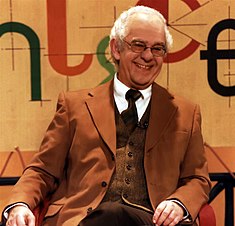Carlos Pinto Coelho
Carlos Pinto Coelho | |
|---|---|
 Carlos Pinto Coelho in his Studio Program (Acontece) | |
| Born | Carlos Nuno de Abreu Pinto Coelho 18 April 1944 Lisbon, Portugal |
| Died | 15 December 2010 (aged 66) Lisbon, Portugal |
| Pen name | Carlos Pinto Coelho |
| Occupation | Journalism, writing, photography |
| Language | Portuguese |
| Education | University |
| Alma mater | Faculty of Law of the University of Lisbon |
| Period | 1968 |
| Genre | Fiction , poetry, photography |
| Notable works | Acontece |
| Notable awards | Order of Infante Dom Henrique(2000) from the President of Portugal Jorge Sampaio
Officier des Arts et des Lettres from the Ministry of Culture of France (2010)
|
Carlos Pinto Coelho (18 April 1944 – 15 December 2010) was a Portuguese journalist, writer, photographer and media personality.
Life and career
Carlos Pinto Coelho was born in Lisbon and lived until he was 19 in
He made his debut in journalism in January 1968 as a reporter in the Lisbon daily newspaper
At RTP – Radiotelevisão Portuguesa
Radio
Editor and host of programs at radios
Teaching
Lecturer at the Institut for High Military Studies( 1988–1992). Professor of journalism at ETIC (Lisbon) and at the Politecnical Institut of Tomar (2003–2006).
He was a member of the Opinion Council at RDP- Portuguese public radio, of the Board of the Portuguese Society of Authors and of the National Board of Portuguese Historical Discoveries.
Other assignments
- 1986–1987 – Member of the Board of the European consortium of television stations Europa TV – Hilversum, Holland.
- 1989–1992: Coordinator for the Meeting of Portuguese-speaking Television Stations: Lisbon – São Paulo/ Rio de Janeiro – Sal (Cape Verde). *1990: President elect of the East-West Committee of the International University of Radio and Television (URTI- Paris).
- 1991: President elect of the North-South Committee URTI.
- 1977–1992: Representative for RTP on the Committees of Information and Programs of EBU (European Broadcasting Union), URTNA (Union of African National Radios and Televisions), OTI (Organization of Iberian-American Television Stations) and the Prize for Script-writing Prix Genève-Europe.
- He was the Representative of Portugal's Ministry of Culture at the Meeting of the Iberian Television Stations (Mexico, 2005).
- He was Member of the Jury of the International Film Festivals of Troia (1986), Fantasporto (1987), Cinanima (1996) and at the Portuguese Film Board ICCAM-2006.
He became a Comendador of the
Published books
- A Meu Ver (Pégaso, 1992)
- Do Tamanho do Mundo (co-autoria – Ataegina, 1998)
- De Tanto Olhar (Campo das Letras, 2002)
- A Meu Ver (2ª edição corrigida e aumentada – ASA, 2006)
- Assim Acontece – 30 Entrevistas Sobre Tudo... E o Resto (Texto Editores, 2007).
- Vozes anoitecidas – Audiobook[7]
Photography
Since 1981 his photographic works went public on 49 solo exhibitions and 7 collective exhibitions, in Portugal, Madeira, Spain, Finland and Mozambique.
References
- ^ Agora Acontece – Radio Program Staff Archived 4 August 2010 at the Wayback Machine
- ^ Destak Portuguese magazine article
- ^ DN TV&MEDIA[permanent dead link]
- ^ French Embassy ceremony Archived 4 August 2010 at the Wayback Machine
- ^ "Bordalo" Award for Television (Casa de Imprensa) – 1995 Archived 18 December 2009 at the Wayback Machine
- ^ Conference promoted by the Biblioteca Municipal de Gouveia
- ^ Audiobook from Mia Couto Archived 17 July 2010 at the Wayback Machine
External links
- Official website
- Carlos Pinto Coelho at IMDb
